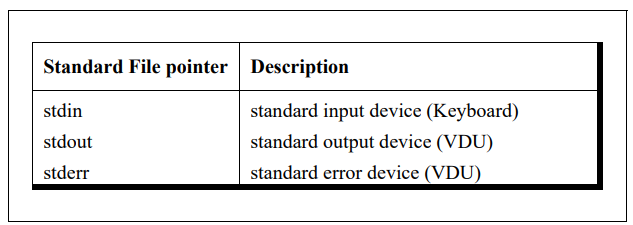Standard I/O Devices
To perform reading or writing operations on a file we need to use the function fopen( ), which sets up a file pointer to refer to this file. Most OSs also predefine pointers for three standard files. To access these pointers we need not use fopen( ). These standard file pointers are shown

Thus the statement ch = fgetc ( stdin ) would read a character from the keyboard rather than from a file. We can use this statement without any need to use fopen( ) or fclose( ) function calls.
Note that under MS-DOS two more standard file pointers are available—stdprn and stdaux. They stand for standard printing device and standard auxiliary device (serial port). The following program shows how to use the standard file pointers. It reads a file from the disk and prints it on the printer.
Prints file contents on printer
#include "stdio.h"
main( )
{
FILE *fp ;
char ch ;
fp = fopen ( "poem.txt", "r" ) ;
if ( fp == NULL )
{
printf ( "Cannot open file" ) ;
exit( ) ;
}
while ( ( ch = fgetc ( fp ) ) != EOF )
fputc ( ch, stdprn ) ;
fclose ( fp ) ;
}
